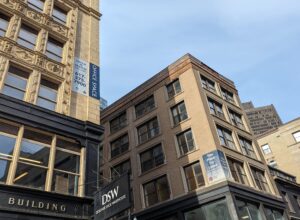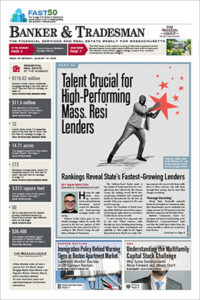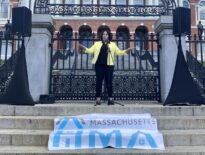
Office buildings with vacant space at the corner of Washington and Bromfield streets in downtown Boston in January 2024. Boston’s office market ended 2023 with a vacancy rate of 15.8 percent, up from 12.5 percent the previous year. Photo by James Sanna | Banker & Tradesman Staff
Boston City Councilors weighing a proposal by Mayor Michelle Wu to ask state permission to temporarily increase the city tax rate on commercial property heard competing and dire predictions from the measure’s supporters and opponents Thursday morning.
As of publication time, the council’s Government Operations Committee had not yet taken a vote on Wu’s proposal, which would shift the city’s split tax rate further onto commercial properties for five years beginning in fiscal year 2025. Under Wu’s proposal, commercial tax rates would spike 17.4 percent to $29.66, while the residential tax rate would decline 7.8 percent to $10.05, according to an analysis by tax consultancy Ryan presented to a meeting of business leaders last week. That analysis predicted the rate increase would cause a $2.6 billion drop in commercial property values across the city, spread across downtown towers, warehouses, single-story neighborhood retail and other commercial building types.
The tax rate increase is necessary, Wu has argued, to close any budget gap created by the falling value of downtown office buildings caused by a dramatic increase in vacant space, largely concentrated in class B and C properties. A report by Wu opponents at the nonprofit Boston Policy Institute and the nonpartisan Tufts University Center for State Policy Analysis estimates the city could see a $500-million-a-year drop in tax collections.
As of publication time, business groups had not yet presented but were expected to reiterate Ryan’s warning about a dramatic reduction in commercial property values and the impact it would have on city services and hurt the city’s ability to attract and retain new businesses and real estate investment when the city’s neighbors and suburbs offered lower tax rates. In addition, some residents who testified earlier in the day Thursday warned the mayor’s plan would amount to a rent increase for many retailers when landlords pass the higher tax rates on via common triple-net lease agreements.
In addition, the groups were expected to argue that the Wu administration’s proposal was a short-term fix for a systemic issue that was better served by creating income-based additional residential tax exemptions and the city’s $1.1 billion rainy-day fund.
“No one wants to burden residents with more taxes. We can all agree on that,” Councilor John FitzGerald, who’s been publicly critical of the mayor’s proposal in the past, said during Thursday’s hearing. “This isn’t actually stopping an increase in residential [tax payments], it’s just spreading it out over four years…I still worry about this proposal not only not solving that issue but also doing irreparable harm to our downtown and small businesses.”
But residents, housing advocates, union leaders and several Boston city councilors warned that a sudden increase in residential tax rates, especially at a time when residential property values and homeowners insurance rates have increased rapidly in recent years, would hammer retirees and new homebuyers alike, and could force lower-income renters out of their homes.
“From a personal perspective and the clients I represent, if I have to pay $1,000 over four years it would soften the blow for me over paying it all up front. It would help me plan for the future,” said Massachusetts Affordable Housing Alliance Executive Director Symone Crawford.
Crawford also argued increased property taxes would create “a burden” first-time homebuyers “could not rebound from.”
Many speakers Thursday morning predicted apartment landlords – whose properties are taxed at the residential rate – would likely pass a sudden increase in residential property taxes on to their tenants.
“We’re in the middle of a sort of tsunami of displacement of retirees” living in lower-priced rentals, City Councilor Liz Breadon said, citing Boston Chief of Housing Sheila Dillon. “If we don’t do something to support those naturally-occurring affordable rentals we’re going to see even more of a problem.”
City Councilor Julia Mejia suggested administration officials look for ways to increase payments-in-lieu-of-taxes, or PILOTs, that the city’s many universities pay instead of property taxes. Colleges and universities’ nonprofit status exempts them from ordinary property tax payments.






